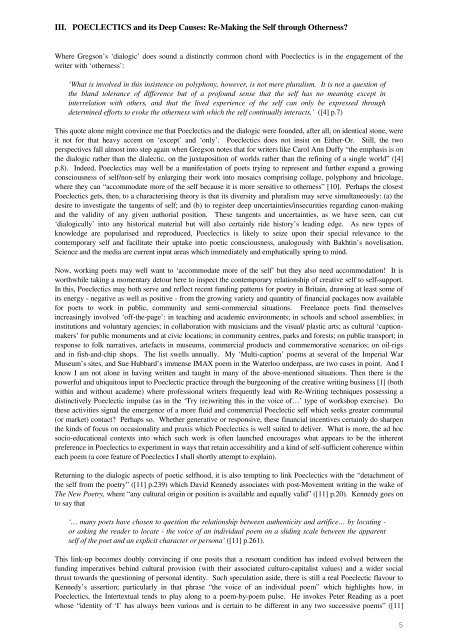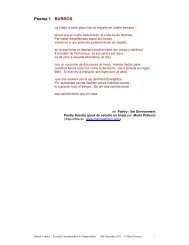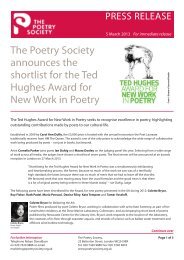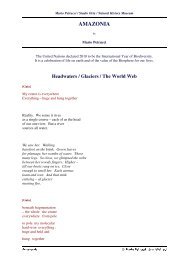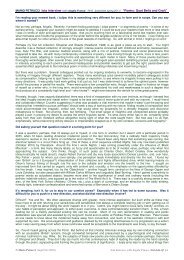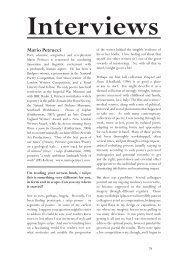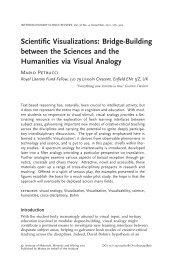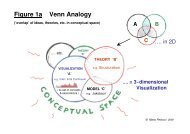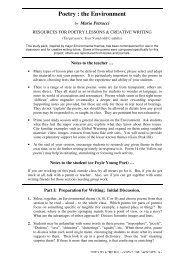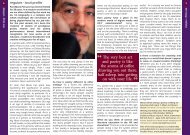poetry in performance: intertextuality, intra-textuality ... - Mario Petrucci
poetry in performance: intertextuality, intra-textuality ... - Mario Petrucci
poetry in performance: intertextuality, intra-textuality ... - Mario Petrucci
You also want an ePaper? Increase the reach of your titles
YUMPU automatically turns print PDFs into web optimized ePapers that Google loves.
III. POECLECTICS and its Deep Causes: Re-Mak<strong>in</strong>g the Self through Otherness?<br />
Where Gregson’s ‘dialogic’ does sound a dist<strong>in</strong>ctly common chord with Poeclectics is <strong>in</strong> the engagement of the<br />
writer with ‘otherness’:<br />
‘What is <strong>in</strong>volved <strong>in</strong> this <strong>in</strong>sistence on polyphony, however, is not mere pluralism. It is not a question of<br />
the bland tolerance of difference but of a profound sense that the self has no mean<strong>in</strong>g except <strong>in</strong><br />
<strong>in</strong>terrelation with others, and that the lived experience of the self can only be expressed through<br />
determ<strong>in</strong>ed efforts to evoke the otherness with which the self cont<strong>in</strong>ually <strong>in</strong>teracts.’ ([4] p.7)<br />
This quote alone might conv<strong>in</strong>ce me that Poeclectics and the dialogic were founded, after all, on identical stone, were<br />
it not for that heavy accent on ‘except’ and ‘only’. Poeclectics does not <strong>in</strong>sist on Either-Or. Still, the two<br />
perspectives fall almost <strong>in</strong>to step aga<strong>in</strong> when Gregson notes that for writers like Carol Ann Duffy “the emphasis is on<br />
the dialogic rather than the dialectic, on the juxtaposition of worlds rather than the ref<strong>in</strong><strong>in</strong>g of a s<strong>in</strong>gle world” ([4]<br />
p.8). Indeed, Poeclectics may well be a manifestation of poets try<strong>in</strong>g to represent and further expand a grow<strong>in</strong>g<br />
consciousness of self/non-self by enlarg<strong>in</strong>g their work <strong>in</strong>to mosaics compris<strong>in</strong>g collage, polyphony and bricolage,<br />
where they can “accommodate more of the self because it is more sensitive to otherness” [10]. Perhaps the closest<br />
Poeclectics gets, then, to a characteris<strong>in</strong>g theory is that its diversity and pluralism may serve simultaneously: (a) the<br />
desire to <strong>in</strong>vestigate the tangents of self; and (b) to register deep uncerta<strong>in</strong>ties/<strong>in</strong>securities regard<strong>in</strong>g canon-mak<strong>in</strong>g<br />
and the validity of any given authorial position. These tangents and uncerta<strong>in</strong>ties, as we have seen, can cut<br />
‘dialogically’ <strong>in</strong>to any historical material but will also certa<strong>in</strong>ly ride history’s lead<strong>in</strong>g edge. As new types of<br />
knowledge are popularised and reproduced, Poeclectics is likely to seize upon their special relevance to the<br />
contemporary self and facilitate their uptake <strong>in</strong>to poetic consciousness, analogously with Bakht<strong>in</strong>’s novelisation.<br />
Science and the media are current <strong>in</strong>put areas which immediately and emphatically spr<strong>in</strong>g to m<strong>in</strong>d.<br />
Now, work<strong>in</strong>g poets may well want to ‘accommodate more of the self’ but they also need accommodation! It is<br />
worthwhile tak<strong>in</strong>g a momentary detour here to <strong>in</strong>spect the contemporary relationship of creative self to self-support.<br />
In this, Poeclectics may both serve and reflect recent fund<strong>in</strong>g patterns for <strong>poetry</strong> <strong>in</strong> Brita<strong>in</strong>, draw<strong>in</strong>g at least some of<br />
its energy - negative as well as positive - from the grow<strong>in</strong>g variety and quantity of f<strong>in</strong>ancial packages now available<br />
for poets to work <strong>in</strong> public, community and semi-commercial situations. Freelance poets f<strong>in</strong>d themselves<br />
<strong>in</strong>creas<strong>in</strong>gly <strong>in</strong>volved ‘off-the-page’: <strong>in</strong> teach<strong>in</strong>g and academic environments; <strong>in</strong> schools and school assemblies; <strong>in</strong><br />
<strong>in</strong>stitutions and voluntary agencies; <strong>in</strong> collaboration with musicians and the visual/ plastic arts; as cultural ‘captionmakers’<br />
for public monuments and at civic locations; <strong>in</strong> community centres, parks and forests; on public transport; <strong>in</strong><br />
response to folk narratives, artefacts <strong>in</strong> museums, commercial products and commemorative scenarios; on oil-rigs<br />
and <strong>in</strong> fish-and-chip shops. The list swells annually. My ‘Multi-caption’ poems at several of the Imperial War<br />
Museum’s sites, and Sue Hubbard’s immense IMAX poem <strong>in</strong> the Waterloo underpass, are two cases <strong>in</strong> po<strong>in</strong>t. And I<br />
know I am not alone <strong>in</strong> hav<strong>in</strong>g written and taught <strong>in</strong> many of the above-mentioned situations. Then there is the<br />
powerful and ubiquitous <strong>in</strong>put to Poeclectic practice through the burgeon<strong>in</strong>g of the creative writ<strong>in</strong>g bus<strong>in</strong>ess [1] (both<br />
with<strong>in</strong> and without academe) where professional writers frequently lead with Re-Writ<strong>in</strong>g techniques possess<strong>in</strong>g a<br />
dist<strong>in</strong>ctively Poeclectic impulse (as <strong>in</strong> the ‘Try (re)writ<strong>in</strong>g this <strong>in</strong> the voice of…’ type of workshop exercise). Do<br />
these activities signal the emergence of a more fluid and commercial Poeclectic self which seeks greater communal<br />
(or market) contact? Perhaps so. Whether generative or responsive, these f<strong>in</strong>ancial <strong>in</strong>centives certa<strong>in</strong>ly do sharpen<br />
the k<strong>in</strong>ds of focus on occasionality and praxis which Poeclectics is well suited to deliver. What is more, the ad hoc<br />
socio-educational contexts <strong>in</strong>to which such work is often launched encourages what appears to be the <strong>in</strong>herent<br />
preference <strong>in</strong> Poeclectics to experiment <strong>in</strong> ways that reta<strong>in</strong> accessibility and a k<strong>in</strong>d of self-sufficient coherence with<strong>in</strong><br />
each poem (a core feature of Poeclectics I shall shortly attempt to expla<strong>in</strong>).<br />
Return<strong>in</strong>g to the dialogic aspects of poetic selfhood, it is also tempt<strong>in</strong>g to l<strong>in</strong>k Poeclectics with the “detachment of<br />
the self from the <strong>poetry</strong>” ([11] p.239) which David Kennedy associates with post-Movement writ<strong>in</strong>g <strong>in</strong> the wake of<br />
The New Poetry, where “any cultural orig<strong>in</strong> or position is available and equally valid” ([11] p.20). Kennedy goes on<br />
to say that<br />
‘… many poets have chosen to question the relationship between authenticity and artifice… by locat<strong>in</strong>g -<br />
or ask<strong>in</strong>g the reader to locate - the voice of an <strong>in</strong>dividual poem on a slid<strong>in</strong>g scale between the apparent<br />
self of the poet and an explicit character or persona’ ([11] p.261).<br />
This l<strong>in</strong>k-up becomes doubly conv<strong>in</strong>c<strong>in</strong>g if one posits that a resonant condition has <strong>in</strong>deed evolved between the<br />
fund<strong>in</strong>g imperatives beh<strong>in</strong>d cultural provision (with their associated culturo-capitalist values) and a wider social<br />
thrust towards the question<strong>in</strong>g of personal identity. Such speculation aside, there is still a real Poeclectic flavour to<br />
Kennedy’s assertion; particularly <strong>in</strong> that phrase “the voice of an <strong>in</strong>dividual poem” which highlights how, <strong>in</strong><br />
Poeclectics, the Intertextual tends to play along to a poem-by-poem pulse. He <strong>in</strong>vokes Peter Read<strong>in</strong>g as a poet<br />
whose “identity of ‘I’ has always been various and is certa<strong>in</strong> to be different <strong>in</strong> any two successive poems” ([11]<br />
5


